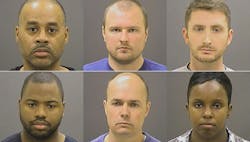Charges Dropped Against Baltimore Officers
BALTIMORE — Prosecutors dropped all remaining charges against three Baltimore police officers accused in the arrest and death of Freddie Gray in a downtown courtroom on Wednesday morning, concluding one of the most high-profile criminal cases in Baltimore history.
The startling move was an apparent acknowledgement of the unlikelihood of a conviction following the acquittals of three other officers on similar and more serious charges by Circuit Judge Barry G. Williams, who was expected to preside over the remaining trials as well.
It also means the office of Baltimore State’s Attorney Marilyn J. Mosby will secure no convictions in the case after more than a year of dogged fighting, against increasingly heavy odds, to hold someone criminally accountable in Gray’s death.
Officer William Porter’s trial ended with a hung jury and a mistrial in December, before Williams acquitted Officers Edward Nero and Caesar Goodson and Lt. Brian Rice at bench trials in May, June, and July, respectively.
In a hearing Wednesday meant to start the trial of Officer Garrett Miller, Chief Deputy State’s Attorney Michael Schatzow told Williams that the state was dropping all charges against Miller, Porter and Sgt. Alicia White.
Porter had been scheduled to be retried in September, and White had been scheduled to be tried in October.
“All of our clients are thrilled with what happened today, and we’ll be making a comment later to address the details of what happened,” said Catherine Flynn, Miller’s attorney, outside the courthouse.
The officers still face possible administrative discipline. Internal investigations, with the help of outside police agencies, are underway.
Gray, 25, suffered severe spinal cord injuries in the back of the van in April 2015 and died a week after his arrest. His death sparked widespread, peaceful protests against police brutality, and his funeral was followed by rioting, looting and arson.
At a news conference in West Baltimore, near where Gray was arrested, Mosby defended her decision to bring the charges against the officers, and said that “as a mother,” the decision to drop them was “agonizing.”
But, given Williams’ acquittal of Nero, Goodson and Rice and the likelihood that the remaining officers would also choose bench trials before him, Mosby said she had to acknowledge the “dismal likelihood” that her office would be able to secure a conviction.
“We could try this case 100 times, and cases like it, and would end up with the same result,” she said. That is in part because of failings in how the judicial system handles charges against police officers, she said.
She said there is an “inherent bias” whenever “police police themselves.” She said the charges she brought were not an indictment of the entire Baltimore Police Department, but she also broadly condemned the actions and testimony of some officers involved in Gray’s arrest or in the department’s investigation of the incident — alleging “consistent bias” at “every stage.”
She said she is not “anti-police,” but “anti-police brutality.” She also noted the “countless sacrifices” of her prosecutors in the case, including Schatzow and Deputy State’s Attorney Janice Bledsoe, and said her office will continue to “fight for a fair and equitable justice system for all.”
In clearing Nero, Goodson and Rice, Williams had repeatedly said that prosecutors presented little or no evidence to support their broader theory in the case — that the officers acted unreasonably, and willfully disregarded their training and general orders, when they decided not to secure Gray in a seat belt, and that the decision directly led to his death.
All of the officers had pleaded not guilty. Their attorneys have said they acted reasonably and professionally, and that Gray’s death was the result of a tragic accident.
The decision Wednesday to drop all charges came during what was expected to be a contentious hearing surrounding the prosecution’s ability to proceed with Miller’s trial without using anything he said on the witness stand in Nero’s trial against him.
Miller had been charged with second-degree assault, reckless endangerment and two counts of misconduct in office related to Gray’s arrest. He was compelled to testify at Nero’s trial under a limited form of immunity designed to protect his constitutional right against self-incrimination while freeing him to speak about the events that transpired on the morning of Gray’s arrest. Before Miller’s trial could proceed, prosecutors were required to show that they had not gleaned any evidence or strategic advantage in Miller’s trial from his immunized testimony.
Having dropped the charges, prosecutors avoided taking the stand.
Copyright 2016 Baltimore Sun
Tribune News Service
